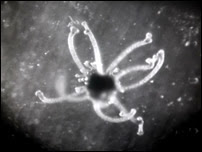
Night Mail
This is the Night Mail crossing the border,
Bringing the cheque and the postal order,
Letters for the rich, letters for the poor,
The shop at the corner and the girl next door.
Pulling up Beattock, a steady climb:
The gradient's against her, but she's on time.
Past cotton-grass and moorland boulder
Shovelling white steam over her shoulder,
Snorting noisily as she passes
Silent miles of wind-bent grasses.
Birds turn their heads as she approaches,
Stare from the bushes at her blank-faced coaches.
Sheep-dogs cannot turn her course;
They slumber on with paws across.
In the farm she passes no one wakes,
But a jug in the bedroom gently shakes.
Dawn freshens, the climb is done.
Down towards Glasgow she descends
Towards the steam tugs yelping down the glade of cranes,
Towards the fields of apparatus, the furnaces
Set on the dark plain like gigantic chessmen.
All Scotland waits for her:
In the dark glens, beside the pale-green sea lochs
Men long for news.
Letters of thanks, letters from banks,
Letters of joy from the girl and the boy,
Receipted bills and invitations
To inspect new stock or visit relations,
And applications for situations
And timid lovers' declarations
And gossip, gossip from all the nations,
News circumstantial, news financial,
Letters with holiday snaps to enlarge in,
Letters with faces scrawled in the margin,
Letters from uncles, cousins, and aunts,
Letters to Scotland from the South of France,
Letters of condolence to Highlands and Lowlands
Notes from overseas to Hebrides
Written on paper of every hue,
The pink, the violet, the white and the blue,
The chatty, the catty, the boring, adoring,
The cold and official and the heart's outpouring,
Clever, stupid, short and long,
The typed and the printed and the spelt all wrong.
Thousands are still asleep
Dreaming of terrifying monsters,
Or of friendly tea beside the band at Cranston's or Crawford's:
Asleep in working Glasgow, asleep in well-set Edinburgh,
Asleep in granite Aberdeen,
They continue their dreams,
And shall wake soon and long for letters,
And none will hear the postman's knock
Without a quickening of the heart,
For who can bear to feel himself forgotten?
(W H Auden)
Grierson inaugura un modelo que reaparecerá con frecuencia en el futuro, empezando por el Office National du Film Canadien cuya creación supervisó él mismo (1939). Este modelo llegará a influir en las futuras televisiones de servicio público. Porque Drifters también es fruto de la implicación del gobierno británico a través de dos organismos oficiales: el EMB, Empire Marketing Board, que tutela el comercio de las colonias y, luego, a partir de 1933, el GPO, General Post Office. Gracias a este excepcional apoyo financiero, Grierson levanta un verdadero taller de producción que se ocupa desde la formación de técnicos a la distribución de las películas. En diez años se producen más de cuatrocientos filmes sobre los más variados ámbitos de actividades (industrias, agricultura, higiene, etc.), sin llegar a entrar, no obstante, en los circuitos comerciales. La gran mayoría de ellos se distribuye a través de redes no comerciales (fábricas, colegios, asociaciones) , que pese a todo implican a un amplio público. En este sentido, las propias películas pasan a ser vínculo entre los hombres, unen ciudades y clases igual que el tren correo une Inglaterra y Escocia, como cuenta el hermoso filme de Basil Wright y Harry Watt, Night Mail (1936), una de cuyas escenas aparece escandida por un poema de W. H. Auden. Industrial Britain (1933), de Flaherty (invitado por un Grierson a la vez fascinado y contrariado por el tiempo que el maestro tarda en realizar el filme); North Sea (1938), de Harry Watt (sobre el guiado por radio de los bous) son algunas de las cintas más representativas de esta idea de una comunidad de los hombres, de una interdependencia general.
Nos hallamos aquí en la encrucijada entre exigencia política e inquietud estética. La voluntad de ir al encuentro del mundo real, de dar una imagen de los seres anónimos que constituyen la vida cotidiana de un país, toma finalmente los acentos de una exhortación a la unión nacional.
Jean Breschand.- El documental: la otra cara del cine.- “Los orígenes del documental” (Págs. 20 y 21)
El tren significaba la modernidad. Pero esto no es un documento, sino que se le describe como poema, no sólo por el trabajo de W.H Auden sino por su forma. Se nos muestra el tren y toda la gente que hace que funcione como una gran maquinaria, poderosa. Para algunos ya formaba parte de sus vidas, vemos a la gente sincronizando su reloj cuando éste pasa.



IMDB
It emphasizes the importance and dignity of a job well done, as well as the emotional importance of mail to the lives of everyday citizens. Indeed, it makes this postal service seem the most important enterprise in the world, not only because it is an efficient human operation, but algo because it facilitates communication between human beings.
In addition to the power in Night Mail, the power of sight and sound, there is also charm, and a characteristically British feeling for detail, efficiency, and the working man. The overall impression is of workers who are dedicated to precision and efficency, yet the seriousness of each simple operation is occasionally lightened by a humor that is equally characteristic of the Briths.
Night Mail represents John Grierson and the British documentary school of the mid 30s at their best, for they successfully fuse social purpose with cinematic experimentation, responding to a dynamic and changing world. The job of the documentary filmmaker was, as Grierson originally said, to render a creative treeatment of actuality.
NON FICTION FILM (link)
http://en.wikipedia.org/wiki/Night_Mail
http://www.screenonline.org.uk/film/id/530415/
http://fama2.us.es/fco/documentaweb/peliculas/Night%20Mail_1936.htm
http://naranjasdehiroshima.kinoki.es/night-mail/



No hay comentarios:
Publicar un comentario